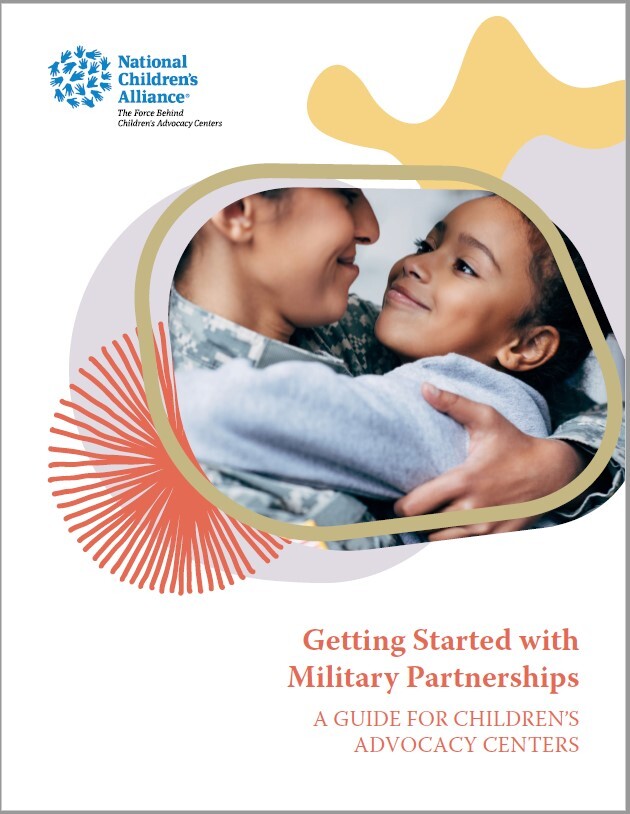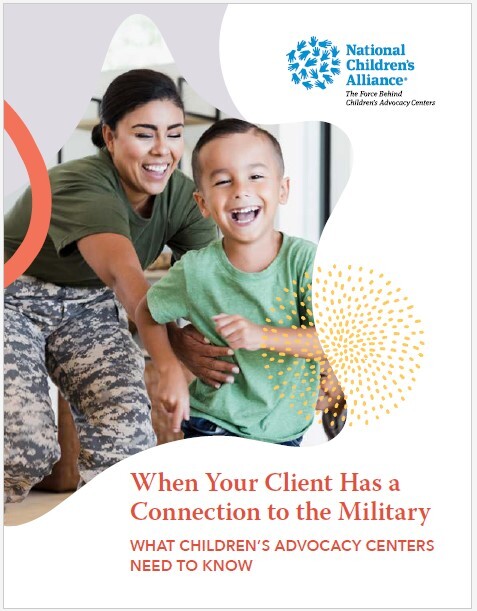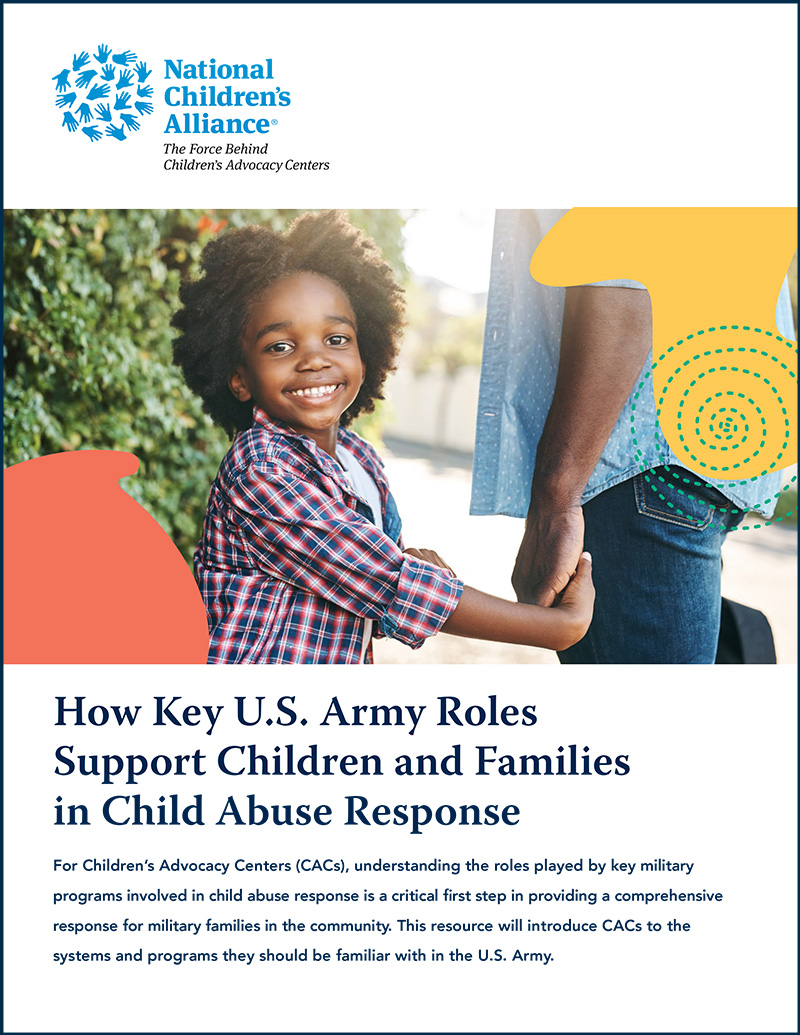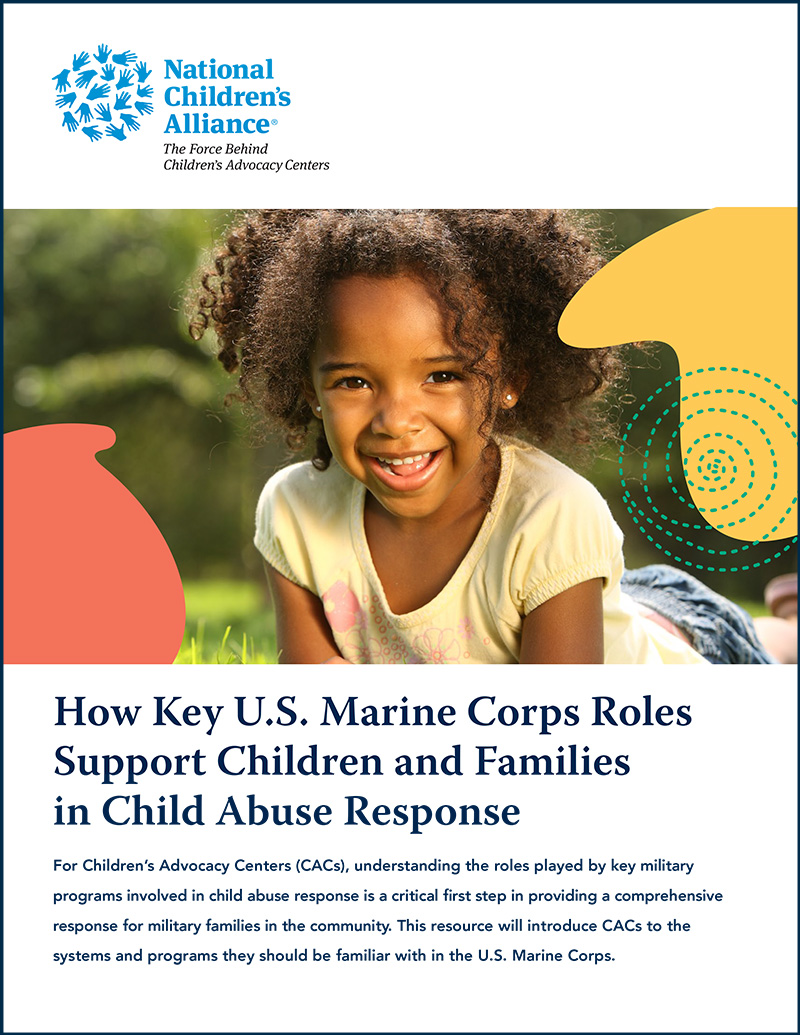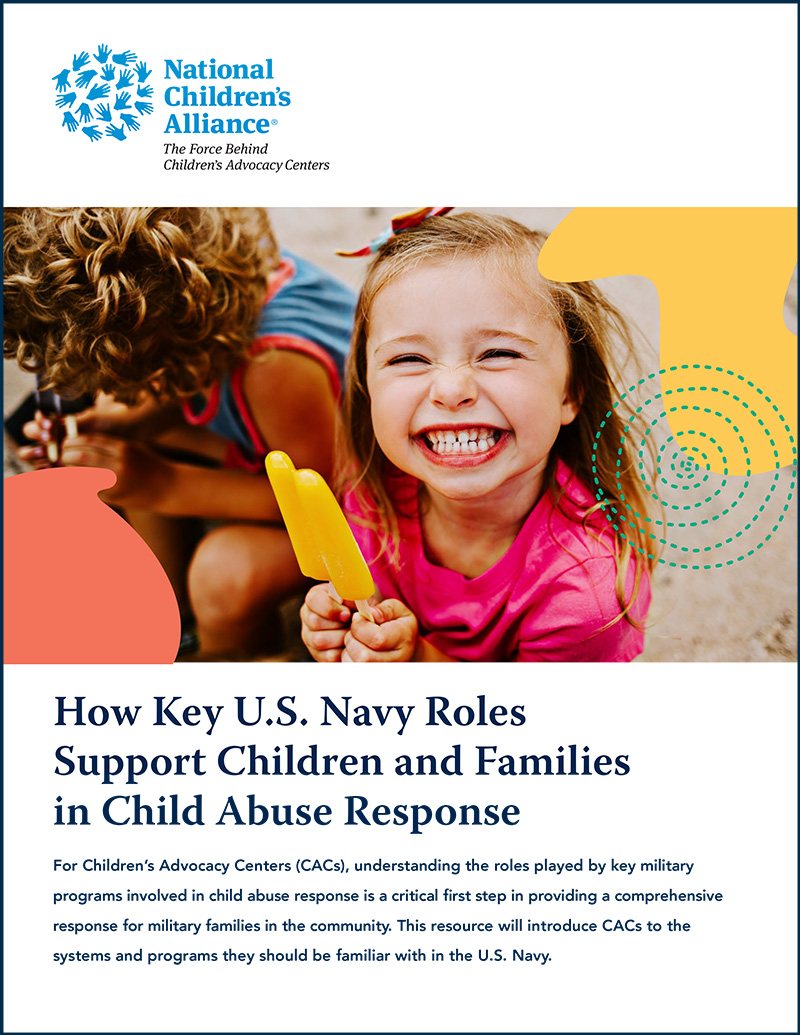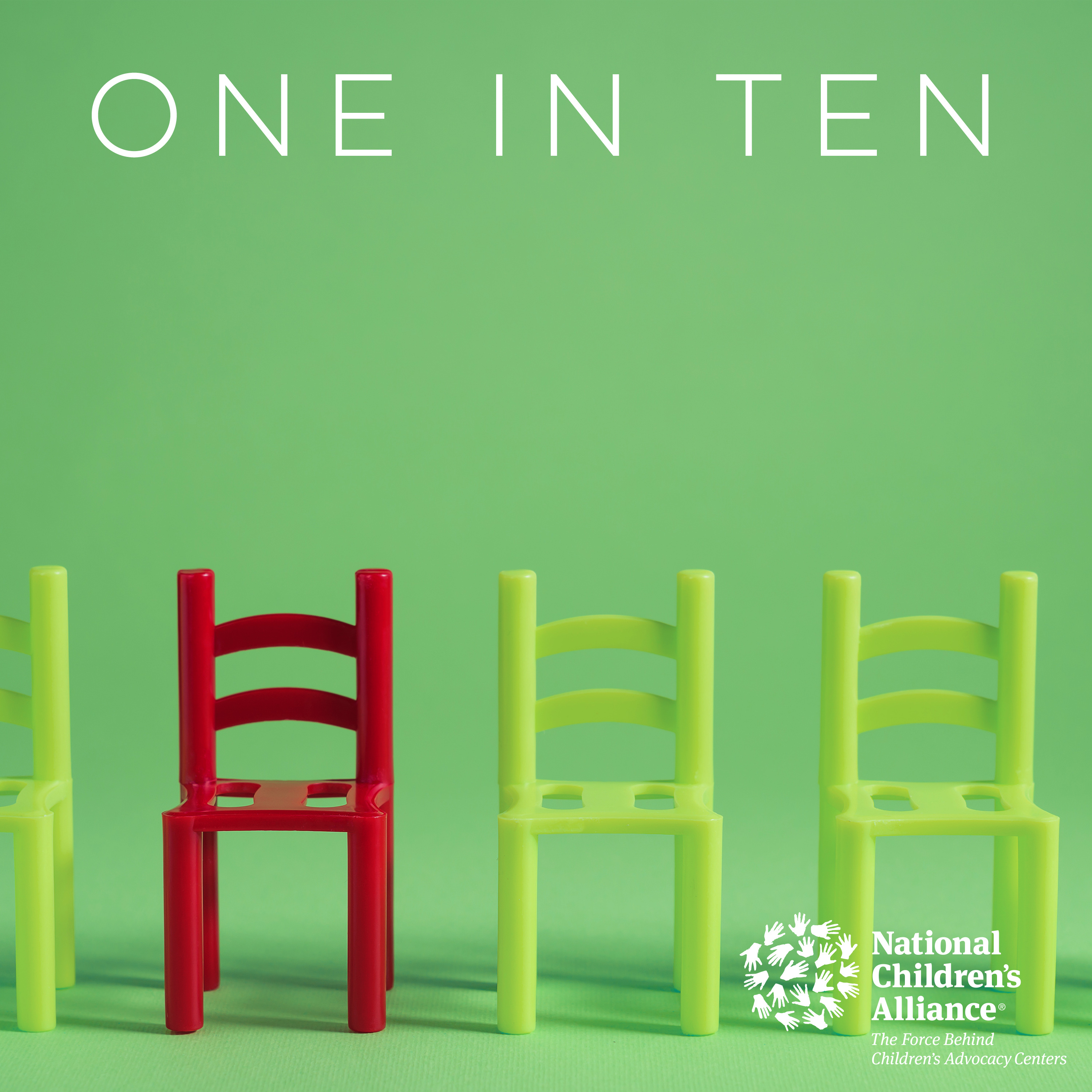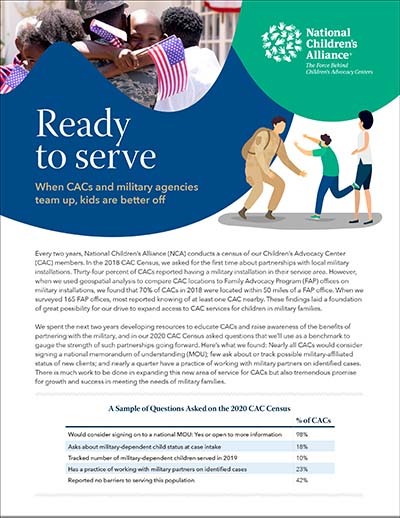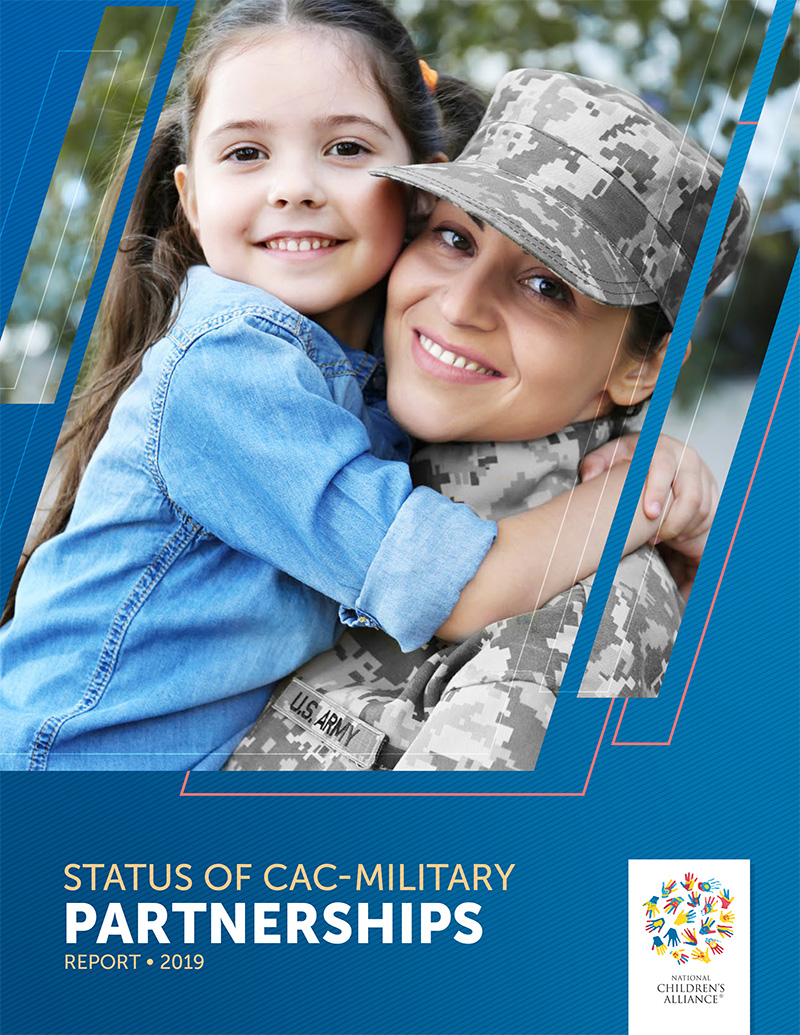
Resources for CAC-Military Partnerships
CACs play an important role in ensuring military families get the coordinated care they need. Learn more by exploring the resources below created by National Children's Alliance and the CAC-Military Partnership Collaborative Work Group to support your work with military partners to strengthen services for military families.
Be sure to also check out Working with Military Families: A Toolkit for CAC Victim Advocates, a collection of trainings and resources for victim advocates working with military families.
Military MOUs: Learn More Here
Additionally, NCA has created a Resources for Military Partners page specifically to meet the needs of our military partners. On this page, military partners can learn about the CAC model, strategies for building partnerships with CACs, and other resources to support collaboration.

Getting Started with Military Partnership Videos
Click a video below to watch.

Getting Started with Military Partnerships - A Guide for CACs
For many CACs, it can be difficult to know how to begin establishing the partnerships necessary for providing a coordinated civilian-military response for military families. The purpose of this resource guide is to help CACs get started. By following the seven steps outlined in this guide, CACs will be well positioned to ensure that military families in their community have access to the coordinated response they deserve.

Children's Advocacy Centers Take Action
Building on past progress, CACs are poised to take big strides forward in their partnerships to enhance services to military families.
In Children's Advocacy Centers Take Action, released in November 2024, we use 2023 CAC Census data to explore how centers across the country are building relationships with their partners in the military, key areas of collaboration success, and steps all CACs can take to ensure that military families have access to coordinated care and CAC services, no matter where they live.
.

When Your Client Has a Connection to the Military
WHAT CHILDREN’S ADVOCACY CENTERS NEED TO KNOW
Screening for military affiliation at intake is the first step CACs must take to ensure comprehensive and coordinated services for military families. And to effectively identify these families, CACs must also understand the various types of military affiliations that families can have. This fact sheet shows how CAC clients may be connected to the military and what key considerations are for each affiliation type.

How Key Military Roles Support Children and Families in Child Abuse Response
Fact sheets for key roles in the Air Force, Army, Marine Corps, Navy and Coast Guard
To learn more about the military programs involved in child abuse response, see our fact sheets about the U.S. Air Force, the Army, the Marine Corps, the Navy, and the Coast Guard


Trauma and Resiliency in Military Families, a One in Ten Podcast Episode
When we think of military families, we rightly think of sacrifice and duty. But do we also think about resiliency, perseverance, and a sense of community? The unique sense of identity that comes with military service comes with a complex set of supports and struggles for service members. Dr. Stephen Cozza, a researcher and professor at the Uniformed Services University, joins us to explore the unique strengths and challenges of military families. What are the risks and protective factors that we should be aware of in working with military families? How does the phases of deployment and re-entry create some points of unique vulnerabilities that we need to attend to? And at a time when many soldiers are returning, how can we support families? We invited Dr. Stephen Cozza, a researcher and a professor at the Uniformed Services University, to speak with us about the unique strengths and challenges of military families. Take a listen.

When Abuse Strikes Twice, a One in Ten Podcast episode
What causes revictimization? How can we prevent it? There are common factors that contribute to child abuse and neglect that may affect any family: job stress, food insecurity, and intimate partner violence, to name just a few. But military families face additional stressors. Miranda Kaye, Ph.D., associate research professor at Penn State’s Clearinghouse for Military Family Readiness, and her colleagues set out to examine what, at the individual, family, and community levels, contributed to revictimization. And the findings about community were perhaps some of the most surprising.

Ready to Serve: When CACs and Military Agencies Team Up, Kids Are Better Off
Overall, our field is still in the relatively early stages of building partnerships between CACs and military installations. But every CAC can take action to ensure military families have access to the services they deserve.
In Ready to Serve, released in November 2021, we use 2020 CAC Census data to explore how centers across the country are building relationships with their partners in the military, where we’re succeeding, and where we have additional opportunities to ensure every child in our community who needs it can benefit from trauma-informed, child-focused CAC services.

Status of CAC-Military Partnerships 2019
Children’s Advocacy Centers and the Military: Where We Are, and Where We’re Going Together
While some 900 Children’s Advocacy Centers in the United States coordinate the critical multidisciplinary services that child abuse victims need to heal, many children from military families experience barriers to receiving those services. Yet early successes in partnerships between CACs and military installation leadership can serve as a model to improve coordination and serve military families better.
We have a roadmap to ensure every military family has access to the services they deserve. Read Status of CAC-Military Partnerships 2019, NCA’s report to Congress on the needs NCA, CACs, Congress, and the military are working to meet together, plus highlights from critical pilot programs nationwide and the status of CAC partnerships with the military in all 50 states.

NCA Military MOU Participation Map
Use the map below to explore military installation locations and Accredited CACs participating in the national military MOUs.
| Access Date | Quiz Result | Score | Actions |
|---|
